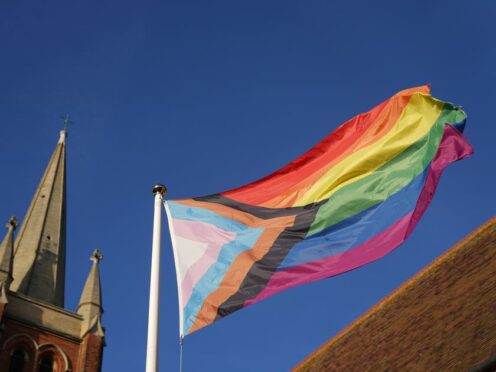
A religious charity has warned Scottish ministers it is ready to mount a legal challenge against plans to end conversion therapy.
The Government’s consultation on proposals to criminalise practices which attempt to change or suppress the gender identity or sexual orientation of others ended on Tuesday.
The Christian Institute has been among the fiercest critics of the draft legislation, arguing the “alarming” proposals harm freedom of religion which could imprison parents or church groups for up to seven years.
Joanna Cook, a public affairs officer for the charity, has now warned ministers the group will take it “all the way to the Supreme Court if necessary”.
The charity said the proposals are “vaguely worded, dangerously broad and would catch innocent, harmless behaviour”, giving the example of a parent potentially prosecuted for preventing her 12-year-old son from going to school with make-up or a dress on.
The Scottish Government has rejected the claim, stating criteria for criminality requires “intention” to suppress, meaning the proposed legislation would have a number of protections, such as where a person was providing advice, or if an individual was seeking help for their own conflicting views on their gender or sexuality.
Similarly, the draft policy states non-directive or non-coercive discussions, general parental direction or restrictions would not be criminalised as long as the individual is allowed to “come to their own decision” without directions.
Suppression, under the plans, can include prescribing medication to suppress sex drive, therapy requiring them not to act on their same-sex attraction or controlling their appearance.
Ms Cook said the charity had commissioned legal advice from human rights lawyer Aidan O’Neill KC, who said the proposals are “ill thought out” and “fundamentally illiberal in intent and effect”.
Mr O’Neill went on to argue he believes the proposals are “beyond the legislative competence” of Holyrood” due to the “intrusion into private and family life”.
Ms Cook said: “There are already strong laws on the statute book to protect gay and trans people. Existing law thankfully tackles verbal and physical abuse in Scotland today.

“But those campaigning for a conversion practices law aren’t content with that. They want a new speech crime. A thought crime. And, I’m afraid, the Scottish Government’s proposals give them that.
“The proposals are vaguely worded, dangerously broad and would catch innocent, harmless behaviour.
“The Government’s plans to introduce ‘conversion practices protection orders’ are especially alarming.
“They would hand the courts very broad powers to restrict the free speech of individuals based purely on activists’ speculation about what they might say to gay or trans people.
“If Parliament passes a law that tramples on basic freedom of speech and religion, we are ready to challenge it all the way to the Supreme Court if necessary.”
Earlier, the Law Society of Scotland, which is generally supportive of legislation banning conversion practices, urged ministers to refine the proposals to prevent legitimate acts being criminalised.
The law body’s submission to the consultation stated the legislation is currently “too broad” and must “avoid the inadvertent criminalisation of innocuous conduct that would ordinarily be considered to fall far below the threshold of criminality”.
A Scottish Government spokesperson said: “Conversion practices, which aim to change or suppress a person’s sexual orientation or gender identity, are damaging and destructive acts that violate human rights. Sadly, these practices still happen and have absolutely no place in Scotland.
“Our proposals are focused on situations where a service is provided or where there is coercive behaviour, using acts that are threatening, abusive, humiliating, punishing or controlling of day-to-day actions, which is carried out consistently or repeatedly.
“In each case there must be a specific intention to change or suppress another person’s sexual orientation or gender identity and harm must have been caused. The proposals recognise and respect the existing legal rights to freedom of thought, conscience and belief and private and family life as well as parents exercising their rights and responsibilities in relation to their children.
“The responses received will now be analysed and considered to inform the Bill the Scottish Government will introduce into Parliament in due course.”

Enjoy the convenience of having The Sunday Post delivered as a digital ePaper straight to your smartphone, tablet or computer.
Subscribe for only £5.49 a month and enjoy all the benefits of the printed paper as a digital replica.
Subscribe